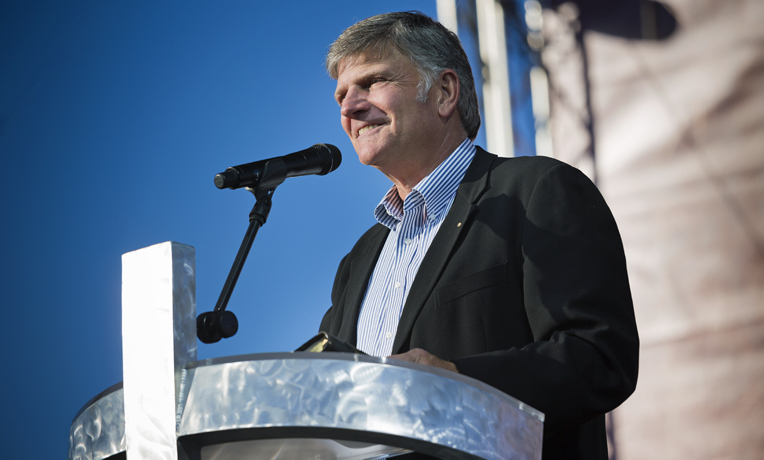Franklin Graham discusses the state of evangelism in the United States in an interview with Lt. Colonel Allen Satterlee, editor-in-chief of The Salvation Army magazine War Cry
The following interview appeared in the August issue of War Cry and is used with permission.
War Cry: What is the spiritual state of North America?
Franklin Graham: It is like it’s always been-it needs Christ. There are millions of people here in North America who are without Christ, who will die in their sins and will be separated from God for eternity in hell. That should be something that causes preachers and evangelists to toss and turn at night and not be able to sleep. It should be a burden to all believers that they will have loved ones, friends and co-workers who will not be in heaven with them. This should be such a burden to us, such a fire in our bosom that we can’t do anything else until we tell others about Christ. I met a man a few years ago in a Christian rock group whose members were all brothers. I asked how he became a Christian. He said, “We are all believers because of my father. My father was an alcoholic, a drug addict, and he got saved. When he got saved his focus in life was for the entire family to get saved. He was divorced from my mother. He came and knocked on the back door. He used to have real long hair, his hair was cut. He banged on the door and said, ‘I found Jesus. I’ve been saved.”‘ This boy said, “It scared us. We were frightened. We thought he’d lost his mind. About two or three months later, we saw the change in our father was so dramatic, that not only did it lead us children to Christ, but our mother as well. Then they got remarried. He didn’t just stop with us children, but it was his parents, her parents, cousins and uncles. It was his duty to evangelize our family. We are followers of Jesus Christ because of our father.” When I heard that I thought, “Boy, now that’s the model that we all need take.” We shouldn’t sleep, we shouldn’t rest, until we know that our family are safe and secure in the hands of Almighty God.
WC: How has evangelism changed in the last 50 years?
FG: Technology has changed the way we present the gospel. It gives us opportunity. My father came on with his ministry just as television was starting and, he was able to use it to take the gospel before a larger audience of people. Today we can take the gospel to many millions of people everyday over the Internet. We can jump across political boundaries; we can go across iron and bamboo curtains, and we can go into countries that are closed to us otherwise. It’s a huge tool. The gospel message does not change: Jesus Christ is the Son of God; He took our sins to the cross; He shed His blood, suffered and died on the cross for our sins; He was buried for our sins and on the third day God raised His Son to life. There’s Holy Spirit-filled power in that message. I don’t understand it, but I can tell you it works. When we present that simple message, that gospel message, God uses it like an arrow, a spear that pierces right into the heart and soul of a person. Like Paul said, “I am not ashamed of the gospel, for it is the power of God for salvation to everyone who believes, to the Jew first and also to the Greek” (Romans 1:16).
WC: Why have so few believers led another person to Christ?
FG: I don’t know, I really don’t. I don’t know if that has been a persistent problem through the centuries, or if this is just a modern day phenomena. It’s troublesome to me, and I don’t get it. The burden for evangelism today is not like it was twenty years ago. Many communities are less interested in evangelism today than they were. When you go into a city to preach, you find a lot of lip service. All these churches will tell you, “Oh absolutely, we are behind you. We’ll be a part of it,” but their people don’t come. Every night of the week there is something in our community going on. It’s almost like we’ve become so busy that we don’t have time for time. We have all of these modern tools to help us, iPhones and iPads and Smartphones, but it seems that they rob more and more of our time.
WC: What do you think it will take to mobilize believers to evangelize?
FG: There will have to be some type of major, national catastrophe that shocks people and brings people back to their knees. God’s going to have to do something to wake America up. We saw this a bit after 9/11. All of a sudden the churches were full. People were talking about God again. People were praying, but it tapered off. When it comes to waking this nation up spiritually, God’s going to have to shake this nation.
WC: Why is there growing hostility in the Western World to Christianity?
FG: I attribute a lot of this to Hollywood, which has molded and shaped culture quite a bit for the last seventy or eighty years. You rarely see a preacher portrayed in a movie in a positive way. I can’t even remember one movie when a preacher is portrayed in a positive way. He is portrayed as a weakling, someone who runs off with the choir director’s wife or some kind of crazy loon. One hundred years ago, pastors were the most powerful men in the community. When there was trouble, people went to the pastor. When there was a crisis, the pastor spoke from the pulpit. Pastors spoke out against slavery. During the Revolutionary War, many pastors led their congregations to fight for freedom. Today pastors have been marginalized and a lot of this has to do with the way they have been portrayed for the last 60-70 years in films. So the church has been weakened. The burden for the souls of men and women is not there. A lot of churches talk about evangelism, but I’m not sure that they fully understand what evangelism is. They think if they get a large crowd on Sunday that they’re doing evangelism. It’s one thing to have your church full, but it’s another thing to take a church full of people and mobilize them to go out into the community to win that community or city to Christ.
WC: Is there anything that makes you hopeful?
FG: In every generation you see young preachers who have studied the Word, and how God has gifted and empowered them. I am encouraged. But when I look at the area of evangelism, years ago there would have been 10-15 evangelists in this country that were known and that had strong support. But when you look today in America, you could probably count them on one hand. That concerns me. I wish that there was another generation of young evangelists coming up. If they’re out there I just don’t know them yet, haven’t seem them.
WC: Is there anything else?
FG: All of this is a part of God’s plan. I want to be faithful to the end.







